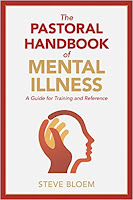 |
| Steve Bloem |
2005 All rights Reserved.
Kregel Publications,Broken Minds Hope for Healing When You Feel
Like You're Losing It Robyn and Steve Bloem
This brings us to a difficult pastoral question. What is the difference between temptation to sin and an obsession? All of us have to deal with thoughts that are sinful and even blasphemous. There is a difference, of course, between the temptation to sin and the actual act of sinning (James 1:13–17), yet we also know that thoughts can be sinful when we dwell on them.
Where, then, does theology fit in treating O.C.D.? Most secular psychiatrist, social workers, and psychologists do not believe in a literal devil or demonic hosts. That doesn’t mean everything these professionals say is wrong, but Christians should keep in mind that a therapist may not be able to recognize spiritual forces at work. Demons do have schemes by which to discourage, depress, and make the child of God feel that God is displeased. Think of how Satan can use unbidden thoughts of O.C.D. to burden one with guilt. A counselor or pastor must acknowledge that these thoughts are not sinful in and of themselves.
As a pastor though speaking more generally about temptation and sin, Lloyd-Jones has some helpful thoughts in how the devil can use OCD to bring sorrow upon sorrow to the Christian,
All Rights Reserved Baker Book House
The Christian Warfare: Ephesians 6
 |
| D. Martyn Lloyd Jones |
We move now to the consideration of another very fruitful source of trouble in the Christian life resulting from the “wiles of the devil,” namely, the confusion between temptation and sin. . . . It includes such problems as evil thoughts, thoughts which may at times be blasphemous, evil imaginations—the imagination tempted to play upon things that are wrong and evil and unworthy. . . . The devil deals with this along certain lines.
One line is to suggest that to be tempted at all is sin. . . . The devil comes in and he says, “Obviously you are not a new creature, you have not been born again, you have not got a new nature. Temptation belonged to the old life and to the past, therefore the fact that you are still tempted is a proof that you are not really what you think you are.” So he comes and says that either the temptation is sin, or else that as Christians we should not be tempted.
Lloyd-Jones goes on to remind us, that we are neither perfect nor
sinless, and that we should
apply Romans 8:10, “If Christ is in you, though the body is dead because of sin,and that goes for the brain, yet the spirit is alive because of righteousness.” We have been redeemed by the blood of the Lamb. We are being saved from the power of sin, but we live in this body that is dying We have disease and temptations and weakness. Some day when we are glorified, we will receive “our adoption as sons, the redemption of our body” (Rom. 8:23). Our minds while be without any sin, there will be no "gray" moments and problem with memory.
apply Romans 8:10, “If Christ is in you, though the body is dead because of sin,and that goes for the brain, yet the spirit is alive because of righteousness.” We have been redeemed by the blood of the Lamb. We are being saved from the power of sin, but we live in this body that is dying We have disease and temptations and weakness. Some day when we are glorified, we will receive “our adoption as sons, the redemption of our body” (Rom. 8:23). Our minds while be without any sin, there will be no "gray" moments and problem with memory.
SB- Again.some Christians with O.C.D. get stuck on 1 John 1:9 and work at a continual, compulsive confession of sin. They fear that they might not have confessed according to God’s standards, so they do it over and over again, sometimes almost chanting the litany of their failings. O.C.D. can be a great trial for a believer. SB.
Pastors and Christian counselors must remind, those who
come to them, “who will bring a charge against God’s elect? God is the one who
justifies; who is the one who condemns? Christ Jesus is He who died, yes,
rather who was raised, who is at the right hand of God, who also intercedes for
us” (Rom. 8:33–34).
This book will be available to the public ,on June 26,2018.How would like to be one of first people to get this book? You can let me know by going to my email at
msn.com via pathema@msn.
The Cost is $23.00 and that includes the shipping to the United States.
How to pay?
1.You can do this by going to our web site and pay by using our paypal site.2. You can can send us a check made out to Steve Bloem.
Please don't forget that Robyn and I have written a book called Broken Minds Hope for Healing When You Feel Like You're Losing It. It is published by Kregel Publications. It was nominated by Forword Magazine to be the best non-fiction book of 2005. Broken Minds is a different book and I think you will like it. We are having a sale right now, which will end soon.
You can see it by going to, http://www.heartfeltmin.org/resources.htmll








